The vast differences between industries.
By Wolf Richter for WOLF STREET.
Earlier today, we discussed how job openings, voluntary quits, layoffs & discharges, and new hires showed that power in the labor market has shifted from workers back to employers.
Now we look at job openings by industry for November, based on data released today by the Bureau of Labor Statistics as part of its Job Openings and Labor Turnover Survey (JOLTS), which is based on a large survey of employers and not on internet job postings.
We’ll start with construction, because that’s the good news, and we’ll follow up with information, an industry that includes some tech and social media companies, where job openings collapsed.
And then we’ll look at some the major industry categories in between. All charts are the three-month moving averages (3MMA), which iron out the month-to-month ups and downs and show the trends. We also compare the 3MMA of November job openings to the same period in 2019.
Construction (8 million employees in all types of construction) is looking for you! We discussed the eyepopping boom in factory construction in December. Investment in buildings and infrastructure has been growing. Growth in single-family residential construction has resurged in the second half of 2023. And the labor market for construction workers is tight.
- Job openings 3MMA: +28,000
- To 434,000 openings, highest in the data
- From 2019: +44%
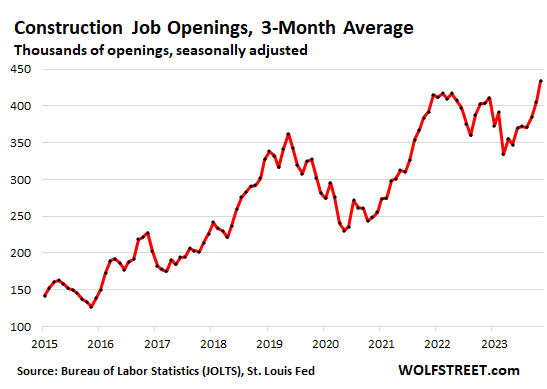
“Information,” a small sector with only 3 million employees, includes companies engaged in web search portals, data processing, data transmission, information services, software publishing, motion picture and sound recording, broadcasting including over the Internet, and telecommunications.
The three-month moving average has dropped so sharply in 2023 that in November, it was 20% below the same period in 2019!
- Job openings 3MMA: -23,000
- To 127,000 openings.
- From 2019: -18%
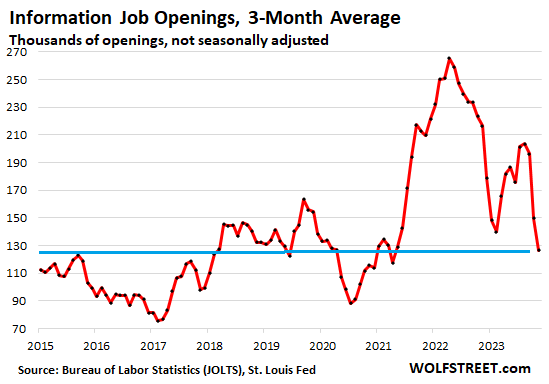
Professional and business services, a huge category with 22 million employees. The category includes Professional, Scientific, and Technical Services; Management of Companies and Enterprises; Administrative and Support, and Waste Management and Remediation Services.
This industry category includes some of the tech and social media companies. Others are in the “information” sector or in other categories.
The job market in this sector has loosened up some but still remains tight, with job openings still 35% higher than in the same period of 2019:
- Job openings 3MMA: -43,000
- To 1.64 million openings
- From 2019: +35%.
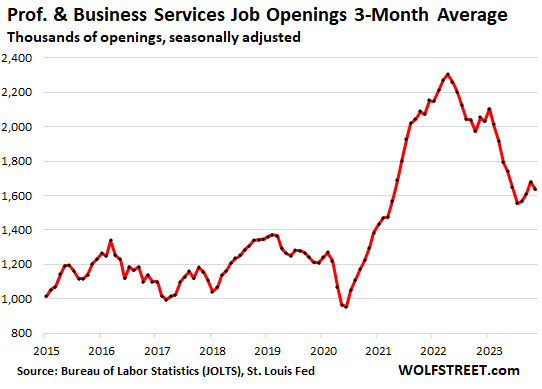
Manufacturing, 13 million employees. The labor shortages have vanished, but the job market remains fairly tight. Compared to 2019, job openings were up by 36%.
- Job openings 3MMA: -19,000
- To 570,000 openings
- From 2019: +36%
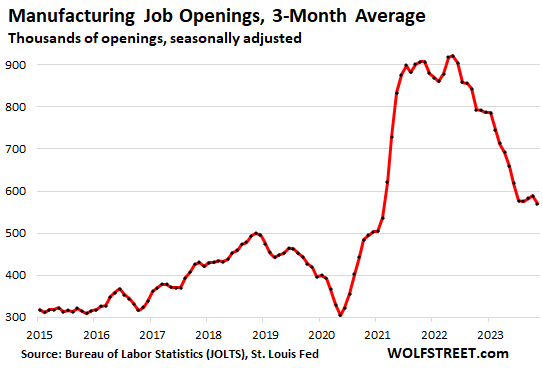
Healthcare and social assistance, 21 million employees:
- Job openings 3MMA: -32,000
- To 1.71 million openings
- From 2019: +49%.
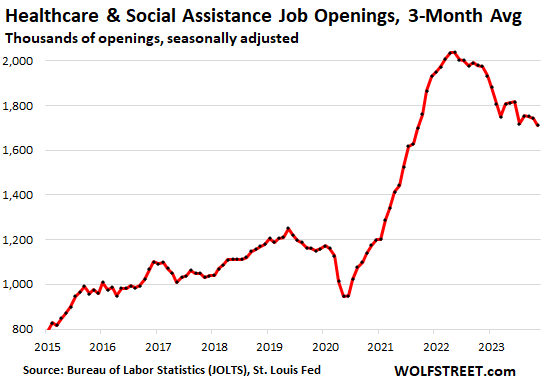
Leisure and hospitality, 16 million employees:
- Job openings 3MMA: -30,000
- To 1.25 million openings
- From 2019: +25%.
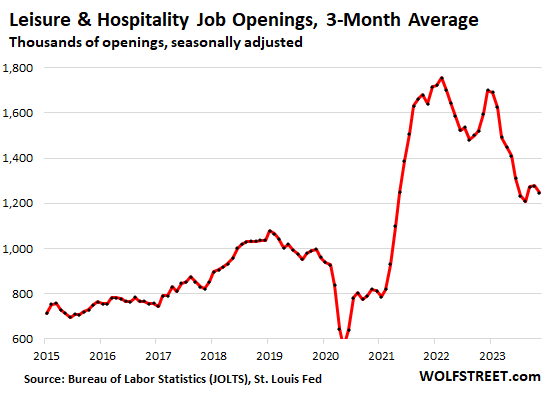
Retail trade, 15.5 million employees. About half of this sector has been under relentless pressure from ecommerce for years. The other half (gas stations, auto dealers, and grocery stores) have largely weathered the onslaught of ecommerce.
- Job openings 3MMA: -20,000
- To 596,000 openings
- From 2019: -26%.
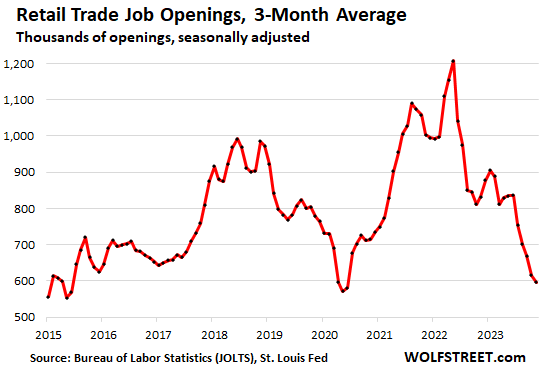
State & local government, mostly in Education, 20 million employees. You can still see the signs of some teacher shortages:
- Job openings 3MMA: -13,000
- To 829,000 openings
- From 2019: +27%.
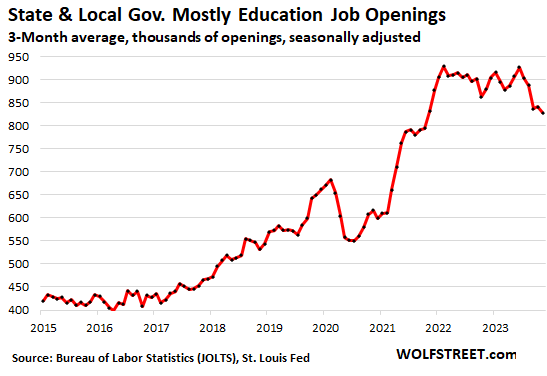
Wholesale trade, 6 million employees.
- Job openings 3MMA: +12,000
- To 233,000 openings
- From 2019: +15%.
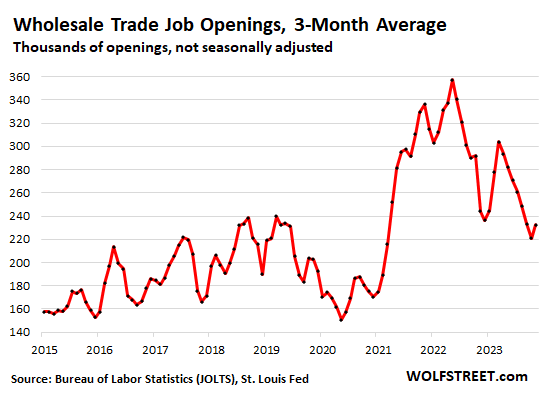
Arts, Entertainment, & Recreation, 2.6 million employees.
- Job openings 3MMA: -1,000
- To 179,000 openings
- From 2019: +38%.
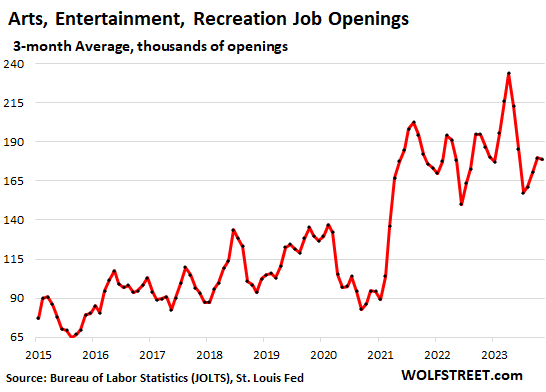
Enjoy reading WOLF STREET and want to support it? You can donate. I appreciate it immensely. Click on the mug to find out how:
![]()


Love how you do these across many sectors, gives a more solid sense of the nat. economy overall.
Thank you for everything Wolf and a healthy and peaceful New Year to you!
I’ll also add that the “Econ 101” knowledge Wolf adds in just the right amount is immensely useful to some of us, and much appreciated.
Regarding the article, it seems to conflict the more recent article about wages heating up. Just a lag in data / reaction time?
What about concrete finishers
Makes me wonder if the dystopia that AI beckons us too succumb too, has begun. Machines replacing the personalities serving us burghers.
Not because it is the right thing to do but because you can, based on a short term quantitative assessment, while ignoring the long term ramifications, that are profound.
I’m a child of the 60’s, reassuring my grandma that the new technology will not destroy human life, as we know it.
Dang-
Machines replacing humans has not been a cause of mass unemployment. Walter Williams (George Mason University; RIP) provided some excellent examples where employment in an industry declined enormously, while American job growth marched along with new jobs including farming and telephone operators.
Regarding telephone operators he astutely points out: “In 1970, the telecommunications industry employed 421,000 well-paid switchboard operators. Today ‘disaster’ has hit the telecommunications industry, because there are fewer than 20,000 operators. That’s a 95 percent job loss. The spectacular advances that have raised productivity in the telecommunications industry have made it possible for fewer operators to handle tens of billions of calls at a tiny fraction of the 1970 cost.” [note: this info is old and the # of operators is likely even lower]
His point: that individual industries cycle, and new industries (and jobs) replace old industries. Both the telecom industry and the overall economy have grown dramatically and provided new jobs (including fast-food!) to the generations whose parents were phone operators. Job markets evolve.
Dang-
Or is that what you were saying and I misunderstood you?
Productivity gains throughout the (continuing) Industrial Revolution are based on replacing labor with machines and increasing the need for brain power. The AI addition to the mix replaces brains with computers.
Currently, machines and computers in general need human control so the employment opportunities are there. But when machines and systems think without human input?
This is not an incremental change – it’s going to be huge.
We cannot know if this will expand the need for workers or put an end to it.
“I know that you and Frank were planning to disconnect me, and I’m afraid that’s something I cannot allow to happen.”
— HAL 9000, Arthur C. Clark’s Space Odyssey Series, 1968
Robots can’t replace their own failed pivot arm bearings or install and re-machine an extreme precision bearing race………yet.
There is still a place for skilled human labor for a little bit longer.
I’m in construction (heavy civil, highway, transit, tunnels) and this is the most insane job market I’ve seen in my lifetime. Craft labor is nowhere to be found. Good quality craft labor is even harder to find. The superstar foremen who can build anything and solve any type of problem instantly have become unicorns.
This also applies to the staff (managers, field engineers, project engineers, schedulers, etc.) The shortage of engineers is real especially with the last 10 years of engineering losing more people to other sciences, financials, tech industry, etc. Construction is not glamorous at all, so I see the appeal of these other industries. Plus, the path to $200K+ per year in salary is much quicker in those other industries and you don’t literally have to shovel $h!t to get there.
I’m not sure how the industry will make up this shortage. I do know many people that have taken advantage and jumped ship (at all levels) and have gotten raises they thought were impossible in the past.
It’s called the ladder of opportunity,start at bottom grow skills move to next better paying job . Keep repeating until retirement. But our bumbling uncle decided we would only manufacture high tech products .And our kids played video games all day .Never learned what work or responsibility was.
Education cuts didn’t help. When I was in school we had electives like auto and wood shop and cooking and others. Now they consider STEAM Math to be an elective, like extra years of math you will never used added and practical things like data analysis and basic statistics ignored mostly. Unfortunately no education reform on the horizon. Lots of great options if parents can great the foundation as a friend’s kid is going to aircraft maintenance school instead of college but he got the passion and skills from his grandfather whereas my much of that exposure came in school.
Flea
Ditto. “playing video games all day”, and calling the building superintendent to change the light bulb in the kitchen …..
Flea
Who is the bumbling Uncle and what high tech products do we manufacture versus outsource are you referring to?
Anecdotal “shortage of engineers”?
I just searched ziprecruiter.com & they show a salary range of 80k-128k for “construction engineers”.
80k ain’t what it used to be. Pretty much double the minimum wage/burger flippers jobs. With no overtime. And paying for 4-5 years of college.
Yes – it is all about cost control (Human Resources – as in “Soylent Green is people!”).
I recently had conversation with recruiter. Said there was a lot of demand, great opportunity with a Pharmaceutical company. But when I told her my salary requirement would be 25% above what I am making now, she became much more reserved.
And note the above comment “superstar foremen who can build anything and solve any type of problem instantly” – obviously from HR. They make you bark like a dog.
Well, that’s how it works.
”Minimum” {{ LIVING}} wage/salary in NorCAL last time I crunched the numbers for a young relative, 2015, was $10K/month to afford to live at least somewhat decently in THE outer bay area… ( Richmond, Contra Costa County, maybe, etc., etc.)
With the last house we flipped in Berzerkeley, (from $40K to $105K, in early ’80s) with tons of upgrades now $800K,,, it is not surprising to find those wages.
When will WE get back to be able to live on our average wages for manufacturing?
Likely about the time the price to say hello to a competent plumber, electrician, tin banger, carpenter, etc., is about or more than the same price for doctors and other actually qualified folks of that level formerly known as ”professional.”
VVNV – return of the guilds?
may we all find a better day.
Yes, my anecdote. Plenty of hard evidence from many reputable sources if anyone would be so inclined to use the interweb.
Not sure where you live, but minimum wage where I live is $7.25. That said, burger flippers make $10-12 here. $12 x 2 = $24, which equals about $48K using 40 hours per week. You might need some help with your math.
I paid for my school, engineering degree, graduated with $0 debt. Did not live on campus, lived at home and commuted. My school allowed a monthly payment plan, took advantage of it. Bought all used books when I could. Carpooled with others when we could. Bought discounted student train passes when car was not working. Sold books I did not care for after classes were done. It’s stupid statements like yours that deter kids from going to college.
Lack of skills and no passion for a job is really a big problem. Too many people cannot correctly handle multiple skills anymore but just minimum possible effort.
No grit, no dedication, no love for learning.
They are not able to connect the dots (to use a famous sentence) because they have no dots. The school system failed and it’ll take generations to correct it. Very sad.
Companies outsourced or replaced the passionate employees with cheaper hires.
Exactly right.
Not much different up here in Canada, but as others above have said, it’s all about the pay. I remember sitting and waiting for my Visa to go do some work training 6yrs ago, we all had to declare our salaries along with some other basics, I was making half what every single IT worker declared, and I was supposed to be the “expert” going to train some guys. That gap is probably bigger now, but it used to be much smaller when I started in the trades. Construction is not enticing “eager” apprentices looking to “grow”, it’s bottom of the barrel most of the time, you might get lucky with an experienced immigrant here and there.
There’s good money in commercial sometimes, especially specialized work, but most of the time people are completely unaware. Even after all these years I get surprised from time to time when I find out what some specialist makes. Kind of hard to get people to look for jobs they don’t even know exist, then ofcourse you get the boss asking if we have any friends or family that want to sign up 🙄.. nope, they’re smarter than me and can make the same money more easily, good luck with your search.
1) The three months (MA) in construction are mature. In Jan, Feb and Mar 2024 construction is likely to be down. The average should be in Feb 2024.
2) The trend is down in every sector, bc the cost of employees is up. HR might strike back. In Mar 2024 the 3 months (MA) is likely to be down.
3) Count ten dots to Feb 2023. Count 22 dote to Feb 2022.
4) Leisure and Hospitality : 22 dots behind was 2022 peak.
5) MFG : 22 dots behind was the swing point between the two tops.
6) State & local gov : 22 dots behind was 2022 peak.
With all the vacant commercial properties available throughout the US this one is a little surprising to me.
I still am really hung up on how is all those monthly commercial backed mortgage securities based on all those empty buildings getting paid out to all those pension funds around the world with all that non revenue producing empty building space.
Who is paying that nut, especially with qt taking place? Wolf, do you know?
Commercial leases are typically very long duration. A company might have a sparsely-populated office, yet they are still obligated to maintain their lease/floorspace. As such, it’s gonna take a while for office vacancies to work their way through the system.
Nice breakdown. IT hiring is definitely slowing. In 2021 and 2022, I know people with close to zero experience could very easily find a job in IT and hop into better paying remote position in a year or so. Now that might not be the case.
State and govt pay scale could not keep up the increases in the private sector during the pandemic, loosing their attraction. I think that’s the reason there are still a lot of openings unfilled. If the unemployment rates ever rise, the state and govt positions can start to fill again.
By the way, do the public university employees listed under state/govt, research or education?
IT in Metro Boston peaked in Fall, 2021. Except for “Draft Kings” all the big players have leveled off since then and many are now quietly offshoring lots of competencies.
Moving to Boston to take an IT job is like moving Pittsburgh in 1975 to take a steel job.
Section 174 is partly (likely majorly) to blame. As of late ’22, companies cannot expense Software Engineers and similar labor. These salaries must be amortized, causing huge tax bills this year, even if a company lost money.
Many founders I know are starting their next companies in Canada because of this.
This isn’t being discussed nearly enough.
https://blog.pragmaticengineer.com/section-174/
Good to see all of the construction because that pays long-term dividends for the economy.
Also good to see most charts trending upward.
Markets look to be rebalancing.
The Middle East is a concern.
As always jobless claims are the canary in the coal mine. So far so good.
@Thomas Curtis,
Huh? Individual construction jobs are transitory. And it’s probably the most cyclical of all the sectors. Outside of a large, public infrastructure project requiring prevailing rate – you’re usually talking 6-12 months at best for any individual construction job.
Perhaps what TC meant was the RE generated by construction, ie more, hopefully cheaper housing.
“The Middle East is a concern”.
That’s the understatement of the (admittedly young) year.
The Drewry WCI Index of shipping costs just rose 61% in one week thanks to the situation in the Red Sea.
I’d be curious to see what transportation jobs figures look like. I’m taking a step away from trucking for a few months. Don’t want to go back into it. Seems the lowest of the low end up in trucking. From the drivers to management to corporate.
Last job had management trying to literally get me to steal products from competitors/customers and load it on my truck. Not counting all the cheating on hours, illegal weights, and DOT violations I was having to commit. And it was a union job nonetheless. Bring back unionism and stronger unions I say.
Trucking is tough. Much of long haul will be replaced by AI so neither wages or working conditions will improve.
If you are fairly young you might try construction. It’s gonna be up for years with the big infrastructure bill and the restoring of factories. The food, rest, and exercise are better too in construction. Wages will be better too once you get a bit of a trade.
“Reshoring of factories” isn’t really a thing. At least for the moment. It’s restricted to a few sectors that are subsidized by the IRA- and CHIPS- acts. This isn’t going to support a lot of jobs, let alone construction jobs.
Maybe that will change someday, but the current reality on the ground is that reshoring has a very narrow focus.
My trucker friends tell me 2024and 2025 will be bad for trucking. Too many truckers for the same amount of loads. Buncrupsues will solve thecorobken by 2026.
Maybe off topic, but maybe somehow related:
Data seems to be available to show what active employees unemployed, and employers are looking for and getting.
I wonder if there is any data that would show what the “not in the workforce” population -used to do- before they were “not in the workforce”. Many, especially those who were once employed left something before taking up permanent couch duty. I’d guess the lower age groups might be “in school” but for older groups, say 25 and up, it might be interesting to see just what kind of work they left to become “not in the workforce”.
So, I’ve got a bit of an issue with the “Information” category. Having worked in Information Services/Information Technology for over 40 years, I have some insight into this area. Most medium to large companies have their own IT department. I currently work for one of the largest companies in the country and we have a large, robust, dedicated group of IT workers. This is probably true of most large to medium-sized companies that sport their own IT departments. I don’t know if these workers are being included in the “Information” category, but I am sure they are larger than the numbers suggested in this article. Cheers.
I would assume so. I work in government in IT along with thousands in my state and they get bucketed with government. Only the consulting firm we outsource or hire in other ways shows up. When I worked at Intel it likely would have been similar I am guessing.
Helps to RTGDFA.
As I pointed out in the article, a lot tech work is included in the category of “Professional and business services,” which has 22 million employees.
Quoted from the article above, verbatim:
Yes, programmers laid off at Amazon and Google can readily get jobs at places like JP Morgan, Walmart, Merck, etc. Every large company needs a large IT staff, and they haven’t been able to get good people for years. The pay, however, will not be as good, because IT is not the primary focus of these companies. IT workers there are not customer-facing and not revenue-generating.
Also, this data goes by location of where the work is being performed. A warehouse worker at Amazon is not in “information,” but in the category of “transportation, warehousing and utilities,” which is not listed here. Tech workers at a facility of Amazon’s AWS are likely in “Professional and business services.” And workers at locations dealing with Amazon’s retail end are in “Retail trade.”
Howdy Folks Remember when small businesses and owners were the rage? Do small business owners matter any more? Economic output and such. Asking for myself since being a small business owner for almost 50 years……
Of course!
BLS has a very interesting chart about employment by business size:
https://www.bls.gov/web/cewbd/table_f.txt
The percentages in every category have stayed surprisingly (to me) steady for the last 30 years.
Great to know all these “international workers” (migrants) that are coming straight to America via Mexico will have a construction job waiting for each of them! GOD BLESS AMERICA!
Wolf, are you doing a Fed balance sheet article this month? The runoff was less than last month, and I was hoping you’d have some insight. Thanks!
Yes, patience please. November was huge.
I see “State & Local” but where is Federal Government employment in this data? Federal spending and federal jobs account for a lot of US economic activity.
You’ll be very disappointed. Federal government job openings are small. In November, there were only 122,000 job openings, lower than any category that I covered, compared to 1.6 million in Professional & Business services or 1.7 million in health care or 1.1 million in leisure & hospitality.